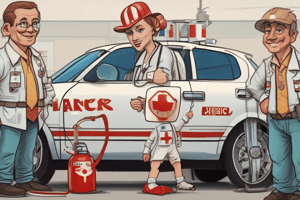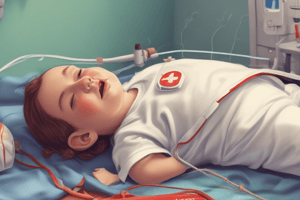Podcast
Questions and Answers
What should you do if a child has an unexplained rash or repeated vomiting?
What should you do if a child has an unexplained rash or repeated vomiting?
You should call the pediatrician for advice.
What emergency action should be taken if a child experiences trouble breathing or extreme swelling?
What emergency action should be taken if a child experiences trouble breathing or extreme swelling?
Call 911 or an emergency number immediately.
Which medication should not be given to children to treat fever and why?
Which medication should not be given to children to treat fever and why?
Aspirin should not be given because it is linked with Reye syndrome.
What should you do if a child is bitten by an animal or human?
What should you do if a child is bitten by an animal or human?
If a child has been exposed to poison, what is the immediate step you should take?
If a child has been exposed to poison, what is the immediate step you should take?
What should you do if clothing catches fire?
What should you do if clothing catches fire?
How should you rinse a dirty object or clothing?
How should you rinse a dirty object or clothing?
What is the appropriate method to cool a burn?
What is the appropriate method to cool a burn?
What should you do with a broken tooth before seeking emergency care?
What should you do with a broken tooth before seeking emergency care?
What immediate action should be taken for large or deep burns?
What immediate action should be taken for large or deep burns?
How should a child be positioned during a nosebleed?
How should a child be positioned during a nosebleed?
What should never be put in a child's mouth during convulsions?
What should never be put in a child's mouth during convulsions?
What should you shout for if you are alone with a choking child?
What should you shout for if you are alone with a choking child?
What immediate action should you take for a choking child who cannot breathe at all?
What immediate action should you take for a choking child who cannot breathe at all?
When should you not start first aid for a choking child?
When should you not start first aid for a choking child?
What should be done if an infant is choking and unable to breathe?
What should be done if an infant is choking and unable to breathe?
What action should you take if a choking child’s normal reflexes are working?
What action should you take if a choking child’s normal reflexes are working?
What should you do if a child has an open wound and is currently immunized for tetanus?
What should you do if a child has an open wound and is currently immunized for tetanus?
How should you treat small cuts?
How should you treat small cuts?
When should you call the pediatrician regarding a bruise?
When should you call the pediatrician regarding a bruise?
What is the first step in treating scrapes?
What is the first step in treating scrapes?
What should you do with a large object embedded in a puncture wound?
What should you do with a large object embedded in a puncture wound?
What is the recommended action for major bleeding?
What is the recommended action for major bleeding?
How can you safely remove a small splinter?
How can you safely remove a small splinter?
What should you not use to clean scrapes?
What should you not use to clean scrapes?
What should you do if a child's wound is gaping?
What should you do if a child's wound is gaping?
What is one common pain relief method the pediatrician may recommend for minor injuries?
What is one common pain relief method the pediatrician may recommend for minor injuries?
Flashcards are hidden until you start studying
Study Notes
Emergency Care For Children
- For any signs of illness or injury that are serious or concerning, contact the pediatrician immediately.
- For less serious injuries, contact the pediatrician directly if unsure.
- In case of emergency, call 911 or the local emergency number immediately.
- For severe allergy reactions, such as hives, nausea, or vomiting, call the pediatrician.
- For spider bites, call the pediatrician and describe the spider, they may recommend contacting a Poison Control Center to get specific advice.
- For any bites that become infected, take the child to the pediatrician for examination.
- For poisoning, call the Poison Control Center at 800/222-1222
- For swallowed poisons, do not induce vomiting unless advised by a medical professional.
- For exposure to fumes, gases, or smoke, move the child to fresh air immediately.
- For a tooth knocked out, place the tooth in clean water or milk and take the child to the pediatric dentist or emergency room.
- For a broken tooth, save all pieces and contact the pediatric dentist immediately.
- For a nosebleed, keep the child in a sitting position with their head tilted slightly forward.
- For major bleeding, apply firm, steady pressure to both nostrils for about 10 minutes. If bleeding continues, seek emergency medical care.
- For seizures or convulsions, ensure the child is safe from objects that could injure them. Loosen any tight clothing. Ensure the child is breathing, if not begin rescue breathing. Call 911 or an emergency number.
- Do not put anything in the child's mouth during a convulsion.
- For all open wounds, ensure the child is up-to-date with their tetanus immunization. They may require a booster shot.
- For bruises, apply cold compresses.
- For deep cuts that are gaping, seek immediate medical attention, stitches may be required.
- For major bleeding, apply sustained pressure with a clean cloth and immediately seek help.
- For scrapes, clean the wound thoroughly with soap and water. Do not use harsh cleansers like alcohol or peroxide. Apply an antibiotic ointment and a bandage
- For splinters, attempt to remove the splinter with tweezers.
- For puncture wounds, call for emergency medical assistance. Do not attempt to remove any large objects from the wound.
- For burns with blisters, do not break the blisters.
- For burns on the face, hands, feet, or genitals, seek medical attention.
- For large or deep burns, call 911 or an emergency number.
- For electrical burns, disconnect the power source before approaching the victim.
- For burns, apply cool water until the pain stops. Do not use ice, butter, grease, or any topical medications.
- For a choking infant under one year old, call the pediatrician immediately.
- For a choking infant under one year old, if you are alone, perform alternating back blows and chest thrusts until the object is dislodged or the infant becomes unconscious.
- For a choking infant under one year old, if they become unconscious, begin infant CPR.
CPR (Cardiopulmonary Resuscitation)
- If an infant is unconscious, or breathing stops, be ready to perform CPR.
- Do not perform a finger sweep to dislodge an object, this can cause the object to be pushed further into the throat.
- Check for response by placing your ear next to the infant's mouth and looking, listening, and feeling for normal breathing or coughing. Look for any body movement.
CHOKING
- You should begin first aid for choking if:
- The child cannot breathe at all.
- The child cannot cough, talk, or make a normal voice sound.
- You should NOT begin first aid for choking if:
- The child can breathe, cry, talk, or make a normal voice sound.
- The child can cough, sputter, or move air at all.
INFANT CPR - If the infant is unconscious or breathing stops.
- For an unconscious infant, begin infant CPR
- If there is no rise or fall in the infant's chest after chest compressions, repeat steps 1 and 2 of INFANT CHOKING.
Keep Emergency Numbers Near Your Phone:
- Pediatrician
- Pediatric Dentist
- Poison Control Center
- Ambulance
- Emergency Department
- Fire Department
- Police
Studying That Suits You
Use AI to generate personalized quizzes and flashcards to suit your learning preferences.




